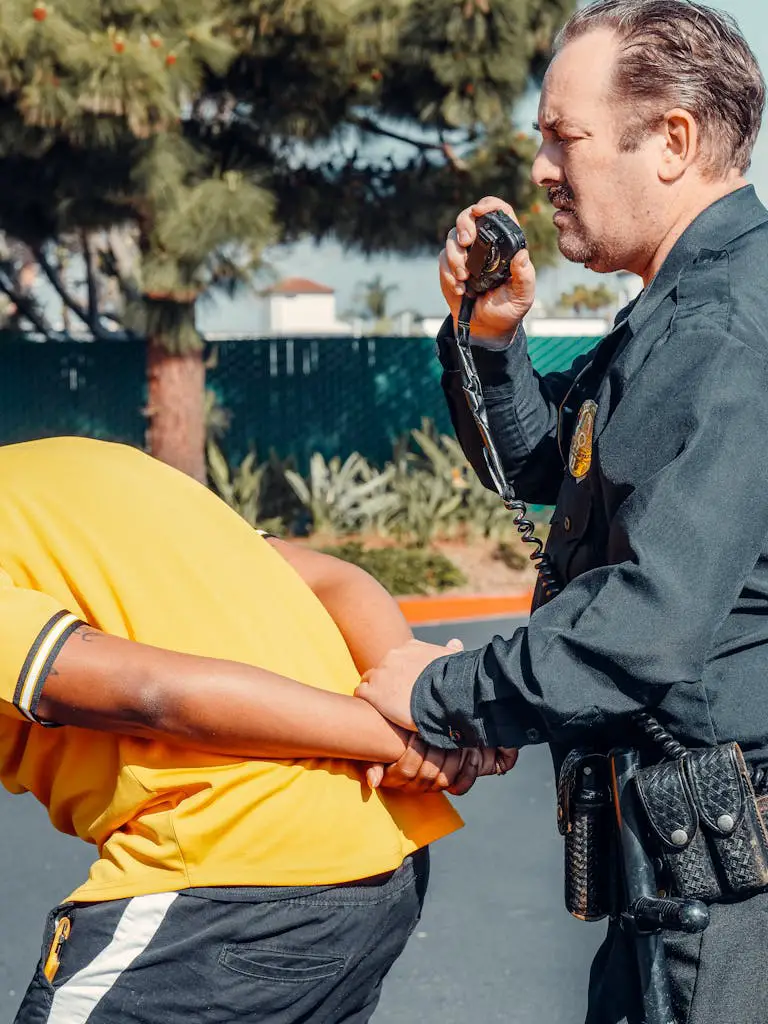Police Want to Question You: Why the Next Step Could Ruin Your Life
Discover exactly what to do when police want to question you. Learn the critical steps to protect your rights and avoid the devastating mistakes that could destroy your future. Updated for 2025 with real case examples.
Introduction
The police want to talk to you. Maybe they called. Maybe they showed up at your work. Maybe they left a card at your door. Your next move will be the most important decision you make. Right now, you might be thinking, “I’ll just explain my side” or “I have nothing to hide.” Stop. This guide could save you from making a mistake that will haunt you for years to come.
Reality Check: The Numbers Don’t Lie (2023-2024)
📊 Critical Statistics
- 80% of convictions involve voluntary statements to police
- 65% of “witnesses” later become suspects
- 92% of people regret talking without a lawyer
- 73% of charges filed stem from voluntary conversations
⚖️ Outcome Impact
- 85% higher conviction rates after voluntary statements
- 3x longer average sentences after giving statements
- 70% of cases plea out after voluntary police contact
- 90% of self-incriminating evidence comes from suspects themselves
💼 Life Impact
- 85% of relationship breakdowns after police statements
- 45% job loss rate after police questioning
- 65% professional license impact
- $25,000+ average legal fees after giving statements
Initial Contact: The Critical Moment
That knock on your door or phone call from law enforcement isn’t a casual chat – it’s a critical moment that could change your life forever. Police are trained in getting people to talk, and right now, you’re in their crosshairs whether you know it or not.
How They Approach You (The Setup)
- “We just need to clear a few things up”
- What this really means: They have evidence and want you to confirm or deny it
- Their goal: Get you talking informally before you realize you need protection
- Reality: Nothing needs “clearing up” without your attorney present
- “This will only take a few minutes”
- What this really means: They’ll keep you talking as long as it takes
- Their goal: Make it seem too brief to need a lawyer
- Reality: Those “few minutes” can provide years of evidence against you
- “We’re talking to everyone in the area”
- What this really means: You’re already a person of interest
- Their goal: Make you feel like a routine witness
- Reality: They’re targeting you specifically, not randomly canvassing
- “Your name came up in our investigation”
- What this really means: Someone implicated you or you’re a suspect
- Their goal: Spark panic and get you talking defensively
- Reality: They’re fishing for your reaction and admissions
Warning Signs You’re A Target
- Repeat Contact Attempts
- Multiple calls or visits
- “Drop by” at work or home
- Contact through family/friends
- Cards left at your door
- Pressure Tactics
- “This is your chance to tell your side”
- “Things will be worse if you don’t talk now”
- “We’ll have to go with what others said”
- “We can help you if you talk to us now”
- Information Fishing
- Questions about your schedule
- Asking about specific dates
- Inquiries about relationships
- Questions about where you were
Real-Life Example: The “Helpful Witness” Trap
Mark received a “routine” call about a break-in near his workplace. Police said they were “just talking to everyone in the area.” Wanting to help, he agreed to a “quick chat.” During the conversation, he mentioned being in the area that night for overtime work. That single detail made him the prime suspect because it placed him at the scene. His helpful statement led to an arrest, despite his innocence. After $30,000 in legal fees, he was cleared – but lost his job and security clearance in the process.
Your Critical First Response
✅ DO Say This (Word for Word) “I do not wish to speak with law enforcement without my attorney present. Please provide your contact information to my attorney.”
❌ DON’T:
- Explain anything
- Deny anything
- Provide alibis
- Show evidence
- Try to help
- Prove innocence
Immediate Action Steps
- Document Everything
- Officer names and badges
- Time and date of contact
- Exact words used
- Contact methods tried
- Witness to the contact
- Preserve Evidence of the Contact
- Save business cards
- Screenshot phone calls
- Keep voicemails
- Note patrol car numbers
- Save any texts or emails
Step 1: Stop and Assess
Your heart’s racing, your mind’s spinning, and the police want answers. Before you make a single move, you need to understand exactly what’s happening. This isn’t about guilt or innocence – it’s about protecting your future from one wrong step.
Understanding Why They Want to Talk
- “It’s Part of an Investigation”
- What this really means: You’re connected to a crime somehow
- Their goal: Link you to criminal activity
- Reality: Everything you say becomes part of their case file
- “Someone Filed a Complaint”
- What this really means: You’re already accused of something
- Their goal: Get your version to compare against the complaint
- Reality: They’re building evidence, not clearing your name
- “Just Following Up on a Report”
- What this really means: You’re named in official documentation
- Their goal: Add your statements to existing evidence
- Reality: The report already contains damaging information
Red Flags That Show You’re a Suspect
- Question Patterns
- Ask about specific dates and times
- Want details about your relationships
- Inquire about your finances
- Request explanations for normal activities
- Ask “what if” scenarios
- Behavioral Signs from Officers
- Take notes during casual conversation
- Ask the same question multiple ways
- Use “we already know” statements
- Mention speaking to others about you
- Try to rush your decisions
- Contact Methods
- Multiple officers involved
- Escalating urgency in attempts
- Contact at work or home
- Pressure from multiple angles
- Attempts to isolate you
Real-Life Example: The Work Meeting Trap
Sarah received a call from detectives wanting to “verify her employment history” for a case. Thinking her HR department was involved, she agreed to meet at her workplace. The detectives showed up in plain clothes, making it seem routine. During their “casual” conversation about her job duties, she inadvertently confirmed handling certain financial transactions. Those statements became the foundation of an embezzlement case. A five-minute “work meeting” turned into a three-year legal nightmare.
Assessment Checklist
✅ Questions to Ask Yourself:
- How did they get my information?
- Who else have they contacted?
- What records might they have?
- What evidence could exist?
- Who might have accused me?
❌ Warning Signs to Watch For:
- Urgency in their requests
- Offers of leniency
- “Off the record” promises
- Good cop/bad cop routines
- Threats about non-cooperation
Strategic Evaluation Steps
- Information Inventory
- What do they claim to know?
- Who have they talked to?
- What documents might they have?
- Which locations are involved?
- What timeline are they investigating?
- Risk Assessment
- Professional licenses at stake
- Employment implications
- Family impacts
- Financial exposure
- Community Standing
Step 2: The Only Response You Should Give
This is your moment of truth. For everything you’ve seen on TV about “telling your side” or “clearing things up,” forget it. There’s only one response that protects you, and anything else risks your future. Let’s break down exactly what to say, how to say it, and why it matters.
The Magic Words (Exact Script)
- Primary Response:
- “I do not wish to speak with law enforcement without my attorney present.”
- Say it exactly like this – no added words
- Repeat as needed, word for word
- Don’t modify or explain
- Remain calm and firm
- Follow-Up Response:
- “Please provide your contact information to my attorney.”
- Nothing more, nothing less
- No matter what they say next
- Regardless of their reaction
- Even if they get aggressive
Common Police Pressure Points (And How to Respond)
- “If you’re innocent, why do you need a lawyer?”
- Their goal: Make you feel guilty about asking for a lawyer
- Your response: Repeat the magic words
- Reality check: Even innocent people get convicted from voluntary statements
- “We’ll have to go with what others said”
- Their goal: Create fear about others’ statements
- Your response: Magic words only
- Reality check: They’re bluffing to get you talking
- “This is your only chance to explain”
- Their goal: Create artificial urgency
- Your response: Magic words, nothing more
- Reality check: Your attorney can arrange proper communication later
Real-Life Example: The Silent Victory
James received a call about “suspicious transactions” at his bank job. Instead of explaining, he calmly used the magic words. Police threatened that “others implicated him” and this was his “only chance.” He repeated the magic words. Frustrated, they revealed they had statements from co-workers. He stuck to the script. Later, his attorney discovered those “statements” didn’t exist – it was a bluff that could have trapped him. By saying only the magic words, he avoided false charges.
Body Language and Tone
✅ DO:
- Maintain calm demeanor
- Keep hands visible
- Stand/sit still
- Speak clearly
- Make normal eye contact
❌ DON’T:
- Cross arms
- Move suddenly
- Show anger
- Look nervous
- Fidget or pace
Recording the Interaction
- If You’re in Public:
- State clearly if you’re recording
- Keep hands visible
- Stay calm
- Maintain distance
- Document badge numbers
- If They’re at Your Door:
- Use home security cameras
- Keep recording devices visible
- Save all footage
- Note time stamps
- Preserve audio quality
Step 3: Getting Protection
You’ve said the magic words, now it’s time for immediate legal protection. This step is critical – the right moves here create a shield around you; the wrong ones leave you exposed. Don’t let cost concerns or uncertainty delay this crucial step.
Finding the Right Attorney (Immediate Action Steps)
- Emergency Legal Contact
- 24/7 criminal defense hotlines
- State bar referral services
- Public defender qualification check
- Legal aid organizations
- Your primary goal: Get protection NOW
- What to Look For
- Criminal defense specialization
- Experience with police investigations
- Local court familiarity
- Clear communication style
- Available for immediate help
- Red Flags to Avoid
- Guarantees specific outcomes
- Pressures immediate payment
- Dismisses situation severity
- Suggests talking to the police
- Can’t be reached quickly
First Call to Attorney
✅ DO Say:
- Exact words the police used
- Type of contact made
- Officers’ names/badges
- Urgency of situation
- Any deadlines mentioned
❌ DON’T:
- Discuss case details on first call
- Share theories about why police called
- Reveal what others might say
- Make admissions of any kind
- Minimize the situation
Real-Life Example: The Swift Protection Success
Maria received police questions about her accounting firm’s clients. Instead of explaining, she immediately called a criminal defense attorney. Within hours, police revealed they were investigating money laundering. Her swift action prevented questioning that could have implicated her in clients’ actions she knew nothing about. The attorney’s immediate intervention kept her from becoming a target.
Cost Considerations
- Initial Consultation
- Many offer free first calls
- Some provide payment plans
- Public defender options
- Legal aid availability
- Investment in your future
- Cost Comparison
- Average self-representation outcome: $50,000+ consequences
- Delayed attorney involvement: $25,000-75,000
- Immediate attorney protection: $5,000-15,000
- Lost wages without an attorney: 3-6 months
- Professional license risk: Priceless
What Your Attorney Should Do Immediately
- First Actions
- Contact investigating officers
- Send preservation letters
- Document all police contact
- Establish communication channels
- Create protection strategy
- Protection Setup
- Case documentation system
- Communication protocols
- Evidence preservation plan
- Witness identification
- Strategic timeline
The Attorney-Client Relationship
Protected Communications:
- Direct conversations with an attorney
- Written correspondence
- Strategy discussions
- Case details
- Evidence reviews
NOT Protected:
- Discussions with family present
- Social media posts about the case
- Conversations with friends
- Public statements
- Third-party communications
Step 4: Damage Control
You’ve got legal protection, but your life extends beyond just the legal realm. This step is about containing the blast radius of police contact. Every aspect of your life needs immediate attention to prevent this situation from spiraling out of control.
Family and Relationships
- Immediate Family Discussion
- Share only essential facts
- Establish communication rules
- Designate one spokesperson
- Create childcare contingencies
- Set privacy boundaries
- What To Tell Them:
- “Police are asking questions”
- “I have legal representation”
- “We need to be private about this”
- “Don’t discuss with others”
- “Follow the attorney’s guidance”
- What NOT To Tell Them:
- Case theories or details
- Other people involved
- Your version of events
- Police conversation details
- Evidence concerns
Work Considerations
- Immediate Professional Steps
- Review employee handbook
- Know reporting requirements
- Document all communications
- Preserve work records
- Consider HR notification
- Professional License Protection
- Check reporting obligations
- Review board requirements
- Document timeline
- Preserve credentials
- Contact licensing attorney
Real-Life Example: The Career Salvation
David, a nurse practitioner, received police questions about prescription records. Instead of panicking, he:
- Immediately reviewed reporting requirements
- Contacted his licensing attorney
- Documented all work records
- Preserved electronic access logs
- Set up proper HR communication Result: Kept his license and job while the investigation cleared him. Colleagues who handled similar situations poorly lost everything.
Digital Lockdown
✅ Immediate Digital Actions:
- Deactivate (don’t delete) social media
- Change all passwords
- Enable two-factor authentication
- Secure cloud storage
- Preserve digital records
❌ Digital Don’ts:
- Delete accounts or data
- Post about investigation
- Discuss case online
- Share theories digitally
- Message witnesses
Evidence Preservation
- Physical Evidence
- Secure important documents
- Preserve electronic devices
- Maintain access logs
- Create evidence inventory
- Document storage locations
- Digital Evidence
- Backup all devices
- Save communication records
- Preserve surveillance footage
- Download account histories
- Archive email records
Financial Protection
- Immediate Financial Steps
- Document current accounts
- Create spending record
- Preserve transaction history
- Setup emergency fund
- Prepare for legal costs
- Account Security
- Change online banking passwords
- Secure credit cards
- Monitor transactions
- Document assets
- Prepare financial records
Communication Control
- Approved Communications
- Attorney discussions
- Immediate family updates
- Required work notices
- Licensed professionals
- Prohibited Communications
- Social media posts
- Group discussions
- Written statements
- Recorded conversations
- Witness contact
Real-Life Consequences: Three Stories That Could Be You
The Facebook Confession: Sarah’s Story
It started with a simple Facebook post. “Can’t believe the police are asking questions about work… I’m innocent!” Sarah thought sharing her story would gather support. Instead, it gathered evidence.
Within hours, her desperate attempts to explain herself online spiraled into a nightmare. Co-workers screenshot her posts. Friends commented with “helpful” details that contradicted her story. Her private group chat messages found their way to investigators. Each notification, each share, each desperate update dug her hole deeper.
When her attorney finally got involved, the damage was devastating. “I can defend against police evidence,” he told her. “I can’t defend against your own words.” The prosecutor had a timeline of contradictions, all voluntarily posted by Sarah herself. Her $75,000 finance job disappeared. The legal bills hit $45,000. Now, three years later, her social media “explanation” still haunts every background check.
The DIY Defender: Marcus’s Story
“I have nothing to hide,” Marcus told himself, inviting detectives into his medical practice. He was proud of his records, confident in his innocence. “Let me show you exactly how we handle prescriptions,” he offered, pulling up files on his computer.
His helpfulness became his undoing. Those voluntary records revealed patterns he hadn’t even considered suspicious. His eager explanations, meant to clear his name, instead provided admissions. When he reached out to staff to “confirm his timeline,” tampering charges were added.
The final toll? Three years in prison. Medical license revoked. Divorce papers served. Life savings drained by $180,000 in legal fees. All because he thought innocence was enough protection.
The Silent Survivor: Lisa’s Story
When detectives called Lisa about “routine questions” at her law firm, red flags went up. Her response was simple: “I declined to speak with law enforcement without my attorney present.” No explanations. No defenses. No social media posts. Just silence and legal protection.
The investigators pushed hard. They claimed others had implicated her. They suggested that “clearing things up” would make everything go away. They mentioned how her silence looked suspicious. Lisa held firm, letting her attorney handle all communication.
Six months later, the investigation closed without charges. Her job remained secure. Her professional license untouched. Her reputation intact. The same investigation that destroyed careers and lives around her couldn’t penetrate her wall of silence.
The Bottom Line
These aren’t just stories – they’re blueprints. Right now, you’re standing where Sarah, Marcus, and Lisa once stood. Your next move will determine which story becomes yours. The only difference between a legal nightmare and a closed investigation often comes down to these critical first steps.
Remember: The police already have a story about what happened. They’re not looking for your side – they’re looking for evidence. Every word you say, post or type can only help build their case. Your silence might feel uncomfortable, but it’s far more comfortable than a prison cell.
Quick Reference Guide: Your Protection Roadmap
| PHASE | KEY ACTION | CRITICAL DON’T | WHY IT MATTERS |
| INITIAL CONTACT | “I don’t speak to police without my attorney” | Don’t try to explain or deny | 80% of convictions come from voluntary statements |
| STOP & ASSESS | Document officer names, badge numbers, time | What you tell others can become a testimony | What you tell others can become testimony |
| LEGAL PROTECTION | Call criminal defense attorney immediately | Don’t wait to see if it “blows over” | Early legal intervention costs 70% less than damage control |
| DAMAGE CONTROL | Deactivate (don’t delete) social media | Don’t post about the situation | Social media provides 65% of voluntary evidence |
| SITUATION | ✅ CORRECT RESPONSE | ❌ WRONG RESPONSE |
| Police Call | “Please contact my attorney” | “Let me explain what happened” |
| Home Visit | “I don’t answer questions without counsel” | “Come in, let’s talk” |
| Work Contact | Document and call attorney | Document and call the attorney |
| Witness Request | “My attorney will contact you” | “I saw everything, let me tell you” |
| WARNING SIGNS | WHAT IT REALLY MEANS |
| “Just clearing things up” | You’re a suspect |
| “Others implicated you” | They’re fishing for information |
| “This is your chance” | They lack solid evidence |
| “Help yourself by talking” | They need your confession |
Frequently Asked Questions: The Real Talk Edition
“But I’m Innocent!” – Your Burning Questions Answered
Q: “If I’m innocent, why can’t I just explain what happened?” Think of it like performing surgery on yourself. Could you do it? Maybe. Should you? Absolutely not. Just like you need a surgeon for operations, you need a legal professional to handle police interactions. Your innocence deserves professional protection, not an amateur explanation.
Q: “The police said this is my only chance to tell my side…” And my grandmother said she was a unicorn. Neither statement is true. This is the equivalent of a used car salesman’s “today only” deal. Police are trained to create artificial urgency. Your side can be told later, through your attorney, in a controlled environment that protects your rights.
Q: “What if they already have evidence against me?” Perfect! Let them keep it. Think of evidence like a game of poker – the police want you to show your hand while keeping theirs hidden. If they really had everything they needed, they wouldn’t be asking you to talk. They’re fishing, don’t take the bait.
The Work & Money Worries
Q: “Won’t invoking my rights make me look guilty at work?” Less guilty than handcuffs at your desk. Your job can survive you saying “I need to consult my attorney.” It probably won’t survive you giving a voluntary confession to the police in the break room.
Q: “I can’t afford an attorney right now…” Can you afford jail? A criminal record? Lost career opportunities? It’s like saying you can’t afford a parachute while skydiving. Public defenders are free. Legal payment plans exist. Your future is worth the investment.
The “What If” Scenarios
Q: “What if they threaten to arrest me if I don’t talk?” Let them! An arrest with your rights intact is better than freedom bought with self-incrimination. Think of it like a hostage negotiation – except you’re negotiating with your future self, and that self is begging you to stay quiet.
Q: “The police said they’re ‘just building a timeline’…” Yes, here is a timeline for the violation of your constitutional rights. They’re building something alright – a case against you. Every “helpful” detail you provide is another brick in that wall.
Family Matters
Q: “Should I tell my family what’s going on?” Tell them this: “Police are asking questions, I have legal representation, and I can’t discuss details.” Anything more turns your loved ones into potential witnesses. Love them enough to keep them off the witness stand.
The Technical Stuff
Q: “What about my phone? Should I delete anything?” Delete nothing. Touch nothing. Think of your digital life like a crime scene – the moment police start asking questions, everything should be preserved exactly as is. Deletion looks like guilt with a paper trail.
The Reality Check Section
Q: “But these officers seem really nice…” So was the Big Bad Wolf to Little Red Riding Hood. Their job is to appear friendly while building a case against you. They’re professionally trained to be the nicest people who will ever ruin your life.
The Choice Is Yours: Your Next Step Decides Everything
The worst mistake you can make right now is thinking “it won’t happen to me.” Every day, good people – teachers, doctors, business owners, parents – wake up to their normal lives and go to bed in a legal nightmare. Not because they’re criminals, but because they didn’t know what you know now.
Think about Sarah, Marcus, and Lisa from our earlier stories. They all started their mornings just like you, never expecting police contact to change their lives. The only difference between their outcomes wasn’t guilt or innocence – it was the decisions they made in those crucial first moments.
You might be sitting there right now, phone in hand, police business card on your desk, wondering if you should “just clear things up.” Your heart’s racing. Your mind’s spinning with explanations. You want this to go away. We understand that urge – it’s human. But this is the moment when humans need to overcome instincts and make smart choices.
Remember:
- Your freedom isn’t negotiable
- Your rights aren’t optional
- Your future isn’t worth gambling
- Your next step matters more than your last one
Taking Action
While this guide gives you the roadmap, navigating the legal system requires experienced guidance. Think of criminal defense like surgery – you wouldn’t operate on yourself, no matter how many articles you’ve read about medicine.
Experienced criminal defense attorneys specialize in protecting people exactly like you – good people facing unexpected police contact. They understand that seeking legal help doesn’t make you guilty; it makes you smart.
Connect with a Criminal Defense Specialist whose services include:
- 24/7 emergency response
- Free initial case evaluation
- Strategic protection planning
- Rights preservation
- Family situation guidance
- Professional license protection
Whether you use this service or find representation elsewhere, the important thing is that you get protection immediately. Your future self will thank you for the wisdom of this moment. Remember, the next chapter of your life starts with your next decision. Make it count.







